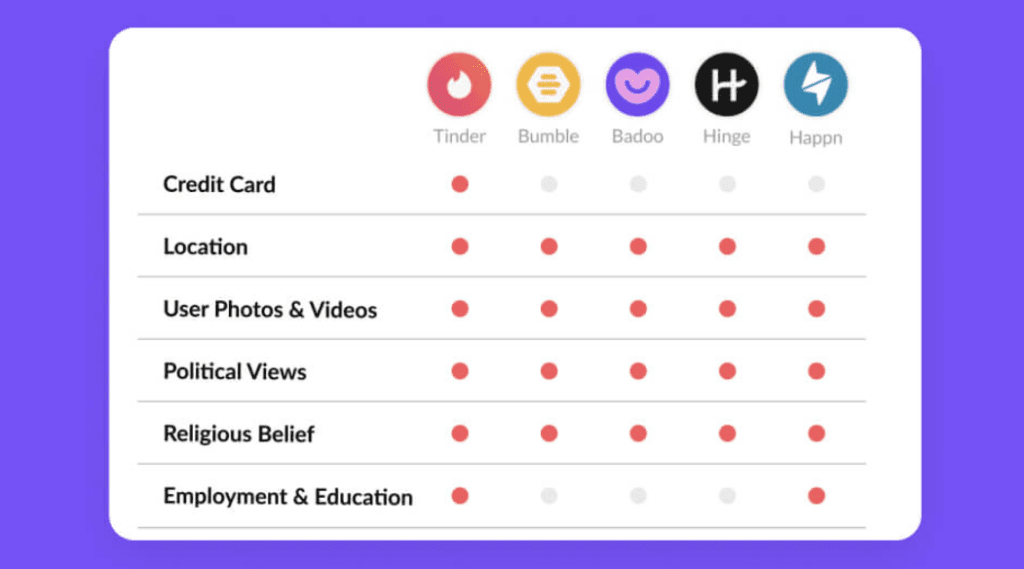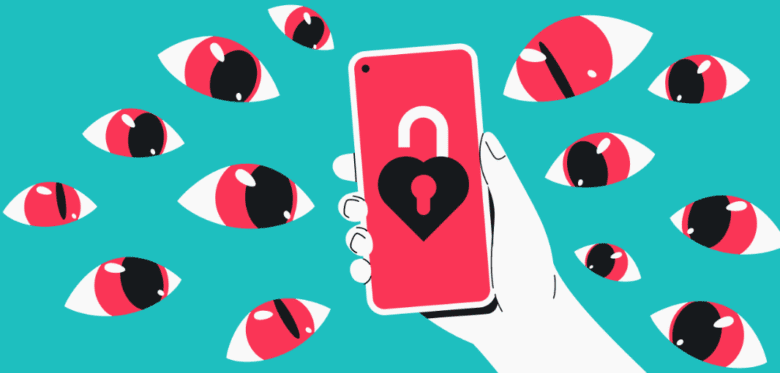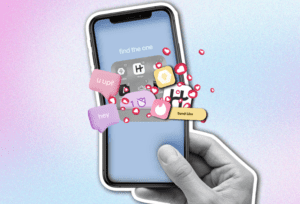In today’s digital age, a dating app is a popular way to meet new people and potentially find love. However, what many users don’t realize is the extent to which these dating platforms collect and use their data. From basic details to precise geolocation data, these apps are gathering more data than you might think. This article delves into the surprising ways dating apps are collecting your information and what you can do to protect your privacy.
The Rise of Dating Apps and Their Popularity
In 2024, dating apps like Tinder, Hinge, Plenty of Fish, and others, are more popular than ever, attracting millions of users worldwide. However, with this popularity comes significant privacy concerns. It’s reported that half of the dating sites on the market collect your precise geolocation to suggest matches, constantly tracking your location.
Moreover, these dating sites often collect metadata from user interactions, such as message timestamps and profile views. Many apps may share or even sell your personal information to third parties, including sensitive data like location and usage patterns. The potential for apps to share or sell your personal data highlights the importance of understanding their privacy and security policies.
As users, it’s crucial to scrutinize the privacy and security measures of these platforms. Knowing how your data is handled can help you make informed decisions about which dating apps to use and how to protect your personal information.

Types of Personal Information Collected by Dating Apps
- Personal Information
These apps collect a range of personal data during the registration and profile creation process. This includes basic details such as your name, age, gender, and sexual orientation. Additionally, users often provide information about their interests, occupations, and education.
- Location Data
Most apps use geolocation data to suggest matches nearby. Apps like Happn and Tantan are designed to show you potential matches you’ve crossed paths with, requiring continuous access to your precise location.
- Usage and Behavioral Data
These apps analyze your behavior on the app, including your swipes, messages, and the profiles you view. This data helps improve their algorithms and provide more accurate matches.
- Device Information
Dating apps also collect data from your device, such as your IP address, device type, and operating system. This information helps optimize the app’s performance and tailor the user experience.
How Dating Apps Use Your Data
- Profile Matching and Recommendations
The primary use of your personal data and behavioral data is to improve profile matching and recommendations. By understanding your preferences and behaviors, dating apps can suggest more compatible matches.
- Targeted Advertising
Your data is often used for targeted advertising. Dating apps can use your information to show you relevant ads within the app, increasing their revenue. Tinder may display ads for dating related products or services that align with your interests and demographics.
- Third Party Sharing
Many dating apps share your personal data with third parties. This can include advertisers, data analysts, and other partners who use this data for various purposes. Your data might be shared with companies that specialize in marketing analytics to help them understand user trends and preferences.
- Internal Analytics and Improvements
Dating platforms utilize collected data for internal analytics to understand user behavior and improve their services. This data helps in making the app more efficient and user-friendly.

Privacy Concerns and Risks
Using dating apps comes with significant privacy concerns. Many apps fall under the privacy not included category, which means they lack robust privacy protections. Some even come with a privacy not included warning label, alerting users to potential risks.
These apps often collect information from your dating profile, treating it more like a data source than a personal space. The content — which is information you share, including your preferences and interactions, is often used as personal information for advertising. This means your data is not just for matchmaking but also for targeted ads, increasing the app’s revenue.
Moreover, there’s more information the companies collect than you might realize. They gather detailed usage patterns and personal details, which can be shared or sold to third parties. This highlights the importance of being cautious about the information the companies can collect.
To protect users’ privacy, it’s crucial to limit app permissions where possible. Adjust your settings to restrict the amount of data you share and regularly review your privacy options. By treating your dating profile more like a public space and being mindful of the information you provide, you can better safeguard your privacy while using these apps.
Protecting Your Privacy While Using Dating Apps
- Reviewing Privacy Policies
Always review the privacy policies of any dating app you use. Understand what data is collected and how it is used. Some apps may explicitly state that they sell your personal data to third parties, while others may have stricter data protection measures.
- Adjusting Privacy Settings
Make use of the privacy settings available in the app. Limit the amount of personal information you share and adjust your visibility to protect your privacy. Most dating apps offer settings that allow you to control who can see your profile and what information is displayed.
- Using Secure Connections
Ensure that your connection is secure when using dating apps. Avoid using public Wi-Fi and consider using a VPN to protect your data. Public Wi-Fi networks are often unsecured and can be exploited by hackers to intercept your data.
- Limiting Personal Information Shared
Be mindful of the personal information you share on your profile. Avoid sharing sensitive details that could compromise your privacy. Refrain from including your full name, address, or workplace in your profile.
- Legal and Regulatory Aspects
Data protection laws such as GDPR and CCPA are designed to protect user privacy. These regulations require dating apps to be transparent about data collection and give users control over their data. For example, under GDPR, users have the right to access, correct, and delete their data.
Conclusion
In conclusion, dating apps gather extensive data about their users, often more than you might not even realize. These apps collect metadata from your content, tracking your interactions and usage patterns. While some information is optional, it’s important to be mindful of what you share.
Apps collect metadata to improve their services, but this data can also be used in ways you may not like, such as targeted advertising. Be cautious with the little information you provide and always review the app’s privacy settings. To enhance your privacy, don’t log in with third-party accounts and don’t link your social media profiles, as this can expose more of your data.
Sometimes you need to be extra cautious to ensure your privacy. While the apps may like to collect as much data as possible, you should limit the information you provide. By being proactive and understanding what data dating apps are collecting, you can better protect your personal information.



